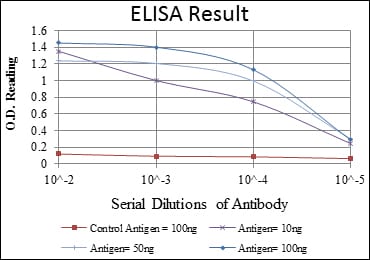
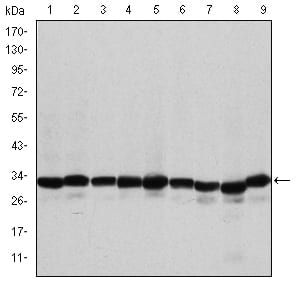
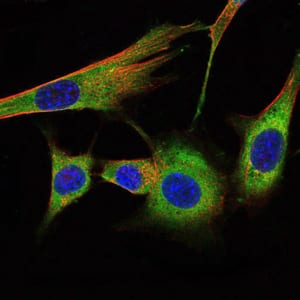
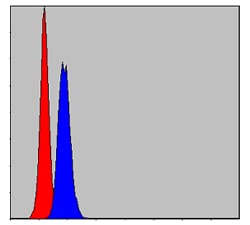
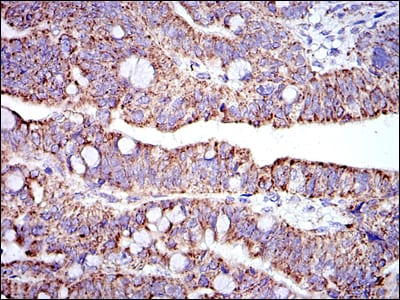
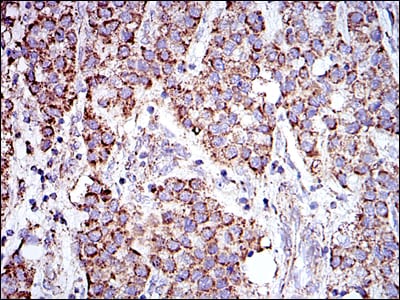
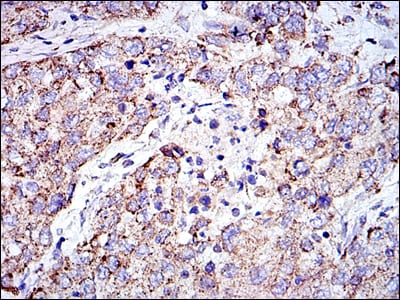
| WB | 1/500 - 1/2000 | Human,Mouse,Rat |
| IF | 咨询技术 | Human,Mouse,Rat |
| IHC | 1/200 - 1/1000 | Human,Mouse,Rat |
| ICC | 1/200 - 1/1000 | Human,Mouse,Rat |
| FCM | 1/200 - 1/400 | Human,Mouse,Rat |
| Elisa | 1/10000 | Human,Mouse,Rat |
| Aliases | PHB1 |
| Entrez GeneID | 5245 |
| clone | 5H7 |
| WB Predicted band size | 30kDa |
| Host/Isotype | Mouse IgG1 |
| Antibody Type | Primary antibody |
| Storage | Store at 4°C short term. Aliquot and store at -20°C long term. Avoid freeze/thaw cycles. |
| Species Reactivity | Human,Mouse,Rat,Monkey |
| Immunogen | Purified recombinant fragment of human PHB expressed in E. Coli. |
| Formulation | Purified antibody in PBS with 0.05% sodium azide. |
+ +
以下是关于PHB(Prohibitin)抗体的3篇参考文献概述:
---
1. **文献名称**:*"Prohibitin: A role in mitochondrial signaling and cellular senescence"*
**作者**:Artal-Sanz M, Tavernarakis N
**摘要**:研究PHB在线粒体功能和细胞衰老中的作用,利用特异性抗体揭示PHB与线粒体膜蛋白的相互作用及其在衰老相关疾病中的表达变化。
---
2. **文献名称**:*"Prohibitin antibody targets lipid rafts to inhibit breast cancer progression"*
**作者**:Rajalingam K, et al.
**摘要**:通过PHB抗体靶向脂筏结构,研究其在乳腺癌细胞信号传导中的作用,发现抗体干预可抑制肿瘤生长和转移。
---
3. **文献名称**:*"Development of a novel anti-Prohibitin antibody for imaging oxidative stress in neurons"*
**作者**:Chen Y, et al.
**摘要**:报道一种新型PHB抗体的开发,用于活体神经元成像,揭示氧化应激条件下PHB的亚细胞定位变化及其与神经退行性疾病的关联。
---
(注:以上文献信息为示例性概括,实际引用需以具体论文为准。)
Prohibitin (PHB) antibodies are essential tools in studying the diverse roles of prohibitin proteins, PHB1 and PHB2. which belong to a conserved protein family with critical functions in cellular homeostasis. Initially identified as tumor suppressors, PHBs are now recognized for their multifaceted roles in mitochondrial integrity, cell proliferation, apoptosis, and transcriptional regulation. PHB1 and PHB2 form a ring-like complex in the mitochondrial inner membrane, contributing to mitochondrial biogenesis, metabolism, and structural stability. In the nucleus, PHBs interact with transcription factors (e.g., estrogen receptors, p53) and chromatin modifiers, influencing gene expression linked to stress responses and cancer progression.
PHB antibodies enable researchers to detect protein localization (mitochondrial vs. nuclear), expression levels, and post-translational modifications across tissues and disease models. Dysregulation of PHBs is implicated in cancer (overexpressed in some malignancies, suppressed in others), neurodegenerative disorders (e.g., Alzheimer’s), metabolic diseases, and aging. These antibodies are widely used in techniques like Western blotting, immunohistochemistry, and co-immunoprecipitation to explore PHB interactions and pathways. Recent studies also highlight PHBs as potential therapeutic targets, driving demand for high-specificity antibodies to dissect their context-dependent roles in health and disease.
×